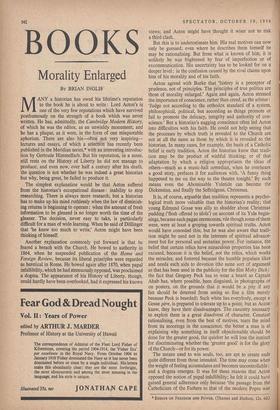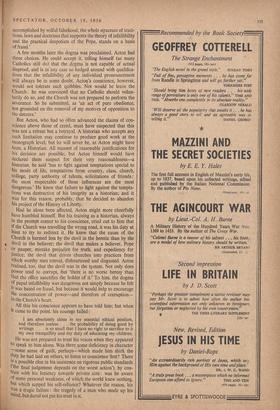Morality Enlarged
BY BRIAN INGLIS MANY a historian has owed his lifetime's reputation to the book he is about to write : Lord Acton's is one of the very few reputations which have survived posthumously on the strength of a book which was never written. He has, admittedly, the Cambridge Modern History, of which he was the editor, as an unwieldy monument; and he has a plaque, as it were, in the form of one misquotable aphorism. There are also his—often not very inspiring— lectures and essays, of which a selection has recently been published in the Meridian series,* with an interesting introduc- tion by Gertrude Himmelfarb. But his reputation, in a sense, still rests on. the History of Liberty he did not manage to produce; and even now, over half a century after his death, the question is not whether he was indeed a great historian but why, being great, he failed to produce it.
The simplest explanation would be that Acton suffered from the historian's occupational disease : inability to stop researching. There is always more research; but a historian has to make up his mind ruthlessly when the law of diminish- ing returns is beginning to operate : when the amount of fresh information to be gleaned is no longer worth the time of the gleaner. The decision, never easy to take, is particularly difficult for a man of wide learning. When he said of Dollinger that 'he knew too much to write,' Acton might have been thinking of himself.
Another explanation commonly put forward is that he feared a breach with the Church. He bowed to authority in 1864, when he suspended publication of the Home and Foreign Review, because its liberal principles were regarded as heretical in Rome. He bowed again after 1870, when papal infallibility, which he had strenuously opposed, was proclaimed a dogma. The appearance of his History of Liberty, though, could hardly have been overlooked, had it expressed his known views; and Acton might have thought it wiser not to risk a third clash.
But this is to underestimate him. His real motives can now only be guessed; even where he describes them himself he may be rationalising. But from what is known of him, it is unlikely he was frightened by fear of imperfection or of excommunication. His uncertainty has to be looked for on a deeper level : in the confusion caused by the rival claims upon him of his morality and of his faith.
Acton agreed with Burke that 'history is a preceptor of prudence, not of principles. The principles of true politics are those of morality enlarged.' Again and again, Acton stressed the importance of conscience, rather than creed, as the arbiter : `Judge not according to the orthodox standard of a system, philosophical, political, but according as things promote or fail to promote the delicacy, integrity and authority of con- science.' But a historian's nagging conscience often led Acton into difficulties with his faith. He could not help seeing that the processes by which truth is revealed to the Church are not at all the same as those by which it is revealed to the historian. In many cases, for example, the basis of a Catholic belief is early tradition. Acton the historian knew that tradi- tion may be the product of wishful thinking; or of that adaptation by which a religion appropriates the ideas of others—much as a music-hall comedian, when he overhears a good story, prefaces it for audiences with, 'A funny thing happened to me on the way to the theatre tonight.' By such means even the Abominable Yuletide can become the Dickensian, and finally the Selfridgean, Christmas.
It is, of course, arguable that tradition represents a psycho- logical truth more valuable than the historian's reality; that young Edmund Gosse was silly to shudder about Christmas pudding ('flesh offered to idols') on account of its Yule begin- nings, because such pagan ceremonies, vile though some of them were, were at least a groping towards spiritual truths. Acton would have conceded this; but he was also aware that tradi- tion might be used not in the interests of spiritual advance- ment but for personal and sectarian power. For instance, the belief that certain relics have miraculous properties has been excused, because it is the belief, not the relics, which works the miracles; and fostered because the humble populace likes and needs such aids to devotion (the same sort of argument as that has been used in the publicity for the film Moby Dick: the fact that Gregory Peck has to wear a beard as Captain Ahab has, where possible, been disguised, in photographs or on posters, on the grounds that it would be a pity if any fan should be deterred from seeing so fine a film merely because Peck is bearded). Such white lies everybody, except a Gosse pere, is prepared to tolerate up to a point; but as Acton knew, they have their disadvantages. The casuistry necessary to exploit them is a great dissolvent of character. Constant rationalising, even from the best of motives, tears the mind from its moorings in the conscience; the better a man is at explaining why something in itself objectionable should be done for the greater good; the quicker he will lose the instinct for discriminating whether the 'greater good' is for the glory of the Church—or for its power.
The means used to win souls, too, are apt to create ends quite different from those intended. The time may come when the weight of feeling accumulates and becomes uncontrollable : and a dogma emerges. It was for these reasons that Acton opposed the notion of papal infallibility; he felt it could have gained general adherence only because 'the passage from the Catholicism of the Fathers to that of the modern Popes was * ESSAYS ON FREEDOM AND POWER. (Thames and Hudson, 12s. 6d.) accomplished by wilful falsehood; the whole structure of tradi- tions, laws and doctrines that supports the theory of infallibility and the practical despotism of the Pope, stands on a basis of fraud.'
A few months later the dogma was proclaimed. Acton had three choices. He could accept it, telling himself (as many Catholics still do) that the dogma is not capable of actual disproof, and is in any case so hedged around with qualifica- tions that the infallibility of any individual pronouncement will always be in some doubt. Acton's conscience, however, would not tolerate such quibbles. Nor would he leave the Church : he was convinced that no Catholic should volun- tarily do so. and the Church was not prepared to perform the severance. So he submitted, as 'an act of pure obedience, not grounded on the removal of my motives of opposition to the decrees.'
But Acton, who had so often advanced the claims of con- science above those of creed, must have suspected that this was not a retreat but a betrayal. A historian who accepts any such limitation may continue to produce good work at the monograph level; but he will never be, as Acton might have been, a Historian. All manner of reasonable justifications for his decision are possible; but Acton himself would have declared them suspect for their very reasonableness—a historian, he said 'has to tight against temptations special to his mode of life, temptations from country, class, church, College, party authority of talents, solicitations of friends: the most respectable of these influences are the most dangerous.' He knew that failure to fight against the tempta- tions was destructive of his integrity as a historian; and it was for this reason, probably, that he decided to abandon his project of the History of Liberty.
Had he alone been affected, Acton might more cheerfully have humbled himself. But his training as a historian, always in the prompt corner to his conscience, cried out to him that if the Church was travelling the wrong road, it was his duty at least to try to redirect it. He knew that the cause of the Church is harmed less by the devil in the heretic than by the devil in the believer; the devil that makes a believer. Pope or pauper, mistake prejudice for truth, and expediency for justice; the devil that drives churches into practices from which worthy men retreat, disheartened and disgusted. Acton realised, too, that the devil was in the system. Not only does Power tend to corrupt, but 'there is no worse heresy than that the office sanctifies the holder of it.' To him. the dogma of papal infallibility was dangerous not simply because he felt It was based on fraud, but because it would help to encourage the concentration of power—and therefore of corruption— in the Church's heart.
All this his conscience appears to have told him; but when it came to the point. his courage failed : I am absolutely alone in my essential ethical position, and therefore useless . . . the probability of doing good by writings . is so small that I have no right to sacrifice to it
my own tranquillity and my duty of educating my children.
He was not prepared to trust his voices when they appeared to speak to him alone. Was there some deficiency in character —some sense of guilt, perhaps—which made him shirk the duty he had laid on others, to listen to conscience first? There is a possible clue in his insistence on rigorous public standards (`the final judgement depends on the worst action'), by con- trast with his leniency towards private sins : was he aware of some personal weakness, of which the world knew nothing, but which sapped his self-reliance? Whatever the reason, his Was a tragic failure : the tragedy of a man who made up his Mind, but dared not put his trust in it.



































 Previous page
Previous page